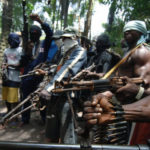Nobel laureate Professor Wole Soyinka has revealed that becoming the first sub-Saharan African to win the Nobel Prize in Literature in 1986 put him in significant danger.
Speaking in an interview with CNN’s Larry Madowo, Soyinka explained that his active involvement in Nigeria’s political struggles, especially during the military dictatorship of Sani Abacha, made him a target.
Soyinka, awarded the Nobel Prize for his “wide cultural perspective and… poetic overtones fashioning the drama of existence,” said the recognition increased his visibility, leaving him feeling isolated and vulnerable.
He remarked, “I always remind people that the most brutal dictator we ever had here, Sani Abacha, would have gone to his grave a happy man if he hanged a Nobel laureate. If he had been able to put on his CV that he hanged a Nobel laureate. As it was, he had to be content with hanging an activist and writer, Ken Saro Wiwa.”
During Abacha’s regime from 1993 to 1998, Soyinka was forced to flee Nigeria, escaping the country on a motorcycle through the Benin border.
In his absence, Abacha declared a death sentence against him. Soyinka only returned to Nigeria in 1999, after the restoration of democracy.
Reflecting on how he marks his birthdays, Soyinka, who turned 90 on July 13, 2024, shared that he doesn’t put much emphasis on celebrating.
“Well, that’s the annoying thing. I don’t feel 90. I feel I just have taken birthdays for granted. Usually, what I do on birthdays is disappear into the forest. That is my normal way of spending birthdays,” he said.
Soyinka’s legacy as a literary icon and outspoken critic of authoritarianism continues to resonate globally, even as he reflects on the personal risks that came with his international recognition.











